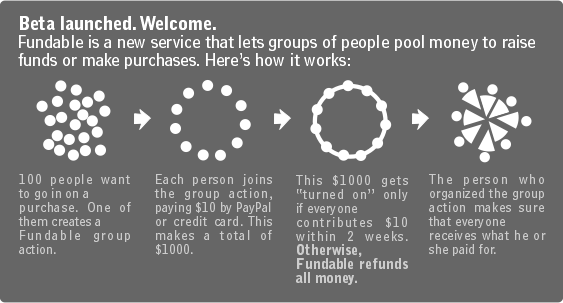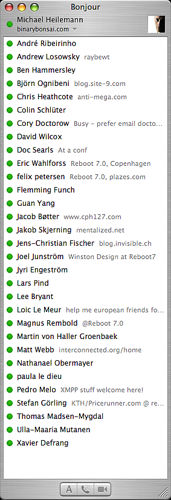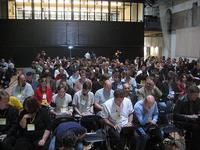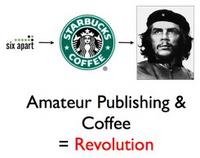|
This is my dynamic, frequently updated homepage. This is a NewsLog, also known as a WebLog or Blog.
Everything is evolving, so don't assume too much.
People to watch:
Adina Levin
Andrius Kulikauskas
Britt Blaser
Catherine Austin Fitts
Chris Corrigan
Clay Shirky
Dan Gillmor
Dave Pollard
David Allen
David Weinberger
Dewayne Mikkelson
Dina Mehta
Doc Searls
Elisabet Sahtouris
Elizabeth Lawley
Euan Semple
Florian Brody
Frank Patrick
Gen Kenai
George Dafermos
George Por
Graham Hancock
Greg Elin
Hazel Henderson
Heiner Benking
Inspector Lohman
Jean Houston
Jerry Michalski
Jim McGee
Jim Moore
John Abbe
John Perry Barlow
John Robb
Joi Ito
Jon Husband
Jon Lebkowsky
Jon Udell
Jonathan Peterson
Judith Meskill
Julian Elvé
Julie Solheim
Kevin Marks
Lawrence Lessig
Leif Smith
Letecia Layson
Lilia Efimova
Lisa Rein
Marc Canter
Mark Oeltjenbruns
Mark Pilgrim
Mark Woods
Martin Dugage
Martin Roell
Mary Forest
Matt Mower
Max Sandor
Michael Fagan
Mike Owens
Mikel Maron
Mitch Kapor
Mitch Ratcliffe
Nathalie dArbeloff
Netron
Noam Chomsky
Paul Hughes
Peter Kaminski
Phil Wolff
Philippe Beaudoin
Ray Ozzie
Raymond Powers
Rebecca Blood
Roger Eaton
Roland Tanglao
Ross Mayfield
Scott Lemon
Sebastian Fiedler
Sebastien Paquet
Skip Lancaster
Spike Hall
Steven Johnson
Stuart Henshall
Thomas Burg
Thomas Madsen-Mygdal
Thomas Nicholls
Timothy Wilken
Todd Suomela
Tom Atlee
Tom Munnecke
Tom Tomorrow
Ton Zijlstra
Lionel Bruel
Loic Le Meur
Nancy White
Mark Frazier
Merlin Silk
Robert Paterson
Colby Stuart
Nova Spivack
Dan Brickley
Ariane Kiss
Vanessa Miemis
Bernd Nurnberger
Sites to watch:
Electronic Frontier Foundation
Co-intelligence Institute
Free Expression Network
Collective Intelligence
Action without borders
Manufacturing Dissent
Explorers Foundation
Disclosure Project
ThoughtsOnThinking
Forbidden Science
Emergent by Design
Greater Democracy
Global Ideas Bank
Independent Media
Space Collective
Friendly Favors
Escape Velocity
Disinformation
Collective Web
WorldChanging
YES Magazine
Disinfopedia
NotThisBody
MetaFilter
Webcamorama
BoingBoing
Smart Mobs
Do No Harm
Imaginify
FutureHi
Openworld
Nanodot
HeadMap
Rhizome
Absara
Edge
Junto
French:
Emmanuelle
Manur
Elanceur
Loeil de Mouche
IokanaaN
Blog d'Or
Le Petit Calepin
GeeBlog
Absara
Guillaume Beuvelot
Ming Chau
Serge Levan
Jean Michel Billaut
C'est pas Mécanique

I live in Toulouse, France where the time now is:
01:11
Unique Readers:

Primarily
Public Domain
Everything I've written here is dedicated to the
Public Domain.

The quotes from other people's writings, and the pictures used might or might not be copyrighted, but are considered fair use. Thus, overall, this weblog could best be described as being:
Primarily Public Domain. |
Syndication:
 ![Validate my RSS feed [Valid RSS]](http://www.newciv.org/pic/valid-rss.png)
|
| Sunday, June 26, 2005 |  |
|
|
|
 Absolutely marvelous article from Clay Shirky, Ontology is Overrated: Categories, Links, and Tags. About how the traditional ways of trying to organize the world hierarchically are on their way out, and wonderous things emerge from tagging links. Well, we knew that tags are a very happening thing, but Shirky spells it out in neon, in great clarity. It is a whole presentation based on some talks he's given recently, with pictures and good examples. This is just the start: Absolutely marvelous article from Clay Shirky, Ontology is Overrated: Categories, Links, and Tags. About how the traditional ways of trying to organize the world hierarchically are on their way out, and wonderous things emerge from tagging links. Well, we knew that tags are a very happening thing, but Shirky spells it out in neon, in great clarity. It is a whole presentation based on some talks he's given recently, with pictures and good examples. This is just the start:"Today I want to talk about categorization, and I want to convince you that a lot of what we think we know about categorization is wrong. In particular, I want to convince you that many of the ways we're attempting to apply categorization to the electronic world are actually a bad fit, because we've adopted habits of mind that are left over from earlier strategies.
I also want to convince you that what we're seeing when we see the Web is actually a radical break with previous categorization strategies, rather than an extension of them. The second part of the talk is more speculative, because it is often the case that old systems get broken before people know what's going to take their place. (Anyone watching the music industry can see this at work today.) That's what I think is happening with categorization.
What I think is coming instead are much more organic ways of organizing information than our current categorization schemes allow, based on two units -- the link, which can point to anything, and the tag, which is a way of attaching labels to links. The strategy of tagging -- free-form labeling, without regard to categorical constraints -- seems like a recipe for disaster, but as the Web has shown us, you can extract a surprising amount of value from big messy data sets."
The cool thing is that the whole tagging thing is still so new that there's plenty of opportunity for innovation. There's still room for inventing the google of tags.
[ Organization | 2005-06-26 01:32 | | PermaLink ] More >
|
|
| Wednesday, June 22, 2005 |  |
|
|
|
 This one in strange. I put it in the full article, so you don't get stuck in your head. Anyway, the instruction is simply to concentrate on the + for a few seconds This one in strange. I put it in the full article, so you don't get stuck in your head. Anyway, the instruction is simply to concentrate on the + for a few seconds
[ Patterns | 2005-06-22 17:08 | | PermaLink ] More >
|
|
| Tuesday, June 21, 2005 |  |
|
|
|
 Seb mentions Fundable. Seems like a great way to raise funds for a particular purpose. Essentially it works like this: Seb mentions Fundable. Seems like a great way to raise funds for a particular purpose. Essentially it works like this:

Recently completed transactions are stuff along the lines of buying a computer for some open source or charitable project, manufacturing t-shirts for some sports club, buying storage for some guy who's moving out, sending a kid to camp, etc.
Quite remarkable that this kind of thing works. It is of course in part because many people like to do good things. And it is also because the site makes the proposition clear and easy and safe. And because many people like completing numbers. So, if there's a site showing that we have 8 our of 10 needed contributors, one kind of gets more motivated to complete the target.
[ Organization | 2005-06-21 18:18 | | PermaLink ] More >
|
|
|
|
Dewf mentions The Rational Street Performer Protocol and an improvement, The Rational Street Performer Protocol.
Groups of people place place donations in escrow, to be released to an author who's promised a certain work, if he puts it into the public domain. In other words, it is a system of private financing for public works. The intent is in part that such a scheme might fund alternative or marginal works that might not otherwise find financing.
The "Rational" protocol adjusts the approach so that the negotiations are done over several rounds and each person pledges a certain ratio out of the total that they're willing to pay, up to a certain maximum amount. The result is a fairly complex formula, but the idea is to show that one's contribution influences the total. So, one can see that one influences the total by more than simply the amount of one's contribution, and thus there should be a higher motivation to contribute, because one can see that one gets something for it.
I don't know if that's necessary. I think what makes the biggest difference is simple stuff, like having one's name listed as one of the contributors.
[ Organization | 2005-06-21 19:30 | | PermaLink ] More >
|
|
| Monday, June 13, 2005 |  |
|
|
|
 This is a snapshot that Michael Heileman took from his iChat program during the Reboot conference. This is a snapshot that Michael Heileman took from his iChat program during the Reboot conference.
If you didn't know, Apple has this protocol called Bonjour, which used to be called Rendezvous. That was a better name, but somebody else sued them for the rights to it. Anyway, what it does is, quite automatically, to notice who's close by on the same local network. So, this is not this person's buddy list across the net. Here it is the people who're present in the same room. Which he might or might not know.
You open up your laptop computer and, bing, right away you see this. And you could of course send these people messages and chat with them, if you had the need. The point is that it is super-easy and automatic. You don't have to go and ask anybody for their username or anything.
This has so far been a Mac-only trick. But Bonjour has just become open source and will become available for any other platform too. There's no particular reason for it to be Mac only. David Weinberger was sitting typing away on his IBM Thinkpad, so he didn't show. It was about 1/2 each of Mac and Windows in that particular location. Windows has never been cool, and amongst famous techie bloggers, a Mac Powerbook is by far the platform of choice. Anyway, that's not the point. Would be better if this worked, no matter what you were running.
Bonjour/Rendezvous is also what enabled instant collaboration through a program called SubEthaEdit. It works over Bonjour. So, you open it up, and instantly you can see who's working on documents in your local area. And if they let you, you can join in in editing the documents. Which looks absolutely magical for collaborative note taking. Each person gets a different color, and all changes are being shown in real time. And it actually works. You can add to other people's notes, take turns, make corrections, etc. Some people are good at taking quotes down verbatim, others are really good at organizing the whole document. And it is basically done when the speech is done, and can be uploaded to a website, for even more people to look at.
I stayed at a Hotel in Vienna for BlogTalk last year. Nobody had said anything about the connection in the hotel, but there was a plug, and as a good techie I scanned the ethernet traffic and guessed at what settings to use and got online in no time. And lo-and-behold, a few other people showed up on rendezvous who had done the same, and I could instantly ask them when the program started, which I somehow had missed too. Plus help somebody who hadn't guessed what IP number to use for the router.
Anyway, nothing new for the folks who're using this all the time, but a little technical magic to share with the people who don't.
[ Information | 2005-06-13 22:58 | | PermaLink ] More >
|
|
| Sunday, June 12, 2005 |  |
|
|
|
 The Reboot conference in Denmark was very enjoyable. Nice to be in my home country for a couple of days, and lots of great speakers and contacts. The Reboot conference in Denmark was very enjoyable. Nice to be in my home country for a couple of days, and lots of great speakers and contacts.
I'm by now used to that a techie conference like that is very wired, but it is still something that would probably be weird to many people. When somebody's speaking, about half the audience is sitting typing on their laptops. They check any websites mentioned, they make collaborative notes, they chat on IRC, they post to their blogs, they coordinate where to go for dinner, or they do whatever they feel like. The result is that there are more dimensions to whatever is going on, and that you probably are more informed, and information is more cross-indexed for you.
Through the magic of tags, you can see most of the blog postings from participants on the Technorati reboot page. It doesn't work great for me personally to make blog postings in real-time, but it is cool that it works for lots of other people. Before a speech even is over, you'll see the first blog postings, and you'll see the pictures people have posted to Flickr. Right this second, there are 1035 photos posted to Flickr on Reboot, and 91 blog postings found by Technorati.
I can't mention everything, but a few highlights from the program...
Inspired keynotes by Doc Searls and David Weinberger, two of the authors of Cluetrain Manifesto. Weinberger was on fire, as somebody said. Doc is always entertaining.
Keynote by Cory Doctorow. In addition to being a science fiction author and editor of BoingBoing, Cory is a big champion for EFF. He talked about some of the latest battles, like the Broadcast Flag. He is very skilled at boiling the issues down to the essential hardhitting facts. There are companies and government agencies in the pocket of Hollywood media companies that work very hard on delivering LESS to you, for MORE money. "Sorry, we've revoked your right to record that TV program".
Lee Bryant on
Negotiating Language and Meaning with Social Tagging. Lee is brilliant and provides great examples of how to use some of this cool technology in real and practical settings. Like for effective community websites for non-profit and government institutions. His recipees are very worth examining.
 Ben Hammersley is crazy and entertaining. His talk, 300 Years of Blogging, Etiquette and the Singularity, presented the idea that blogging has parallels to the phenomenon of papers with comments on issues of the day that were handed out and discussed in coffee houses in England 300 years ago. And he made some intriguing comments on how rudeness and embarrassment might be bigger issues than technology on the net for most people. You know, for his grandmother, the issue of adware on her computer putting stuff up she doesn't want is just so damned rude. It isn't an issue of what flaws IE might have, it is just rude behavior. And how some people might be very conscious of what other people might think, and therefore hold themselves back from doing stuff they technically could do easily. Like his wife who wanted to participate in a certain game, but was afraid to, because she didn't want to be seen doing something wrong, or accidentally messing something up for somebody. Ben Hammersley is crazy and entertaining. His talk, 300 Years of Blogging, Etiquette and the Singularity, presented the idea that blogging has parallels to the phenomenon of papers with comments on issues of the day that were handed out and discussed in coffee houses in England 300 years ago. And he made some intriguing comments on how rudeness and embarrassment might be bigger issues than technology on the net for most people. You know, for his grandmother, the issue of adware on her computer putting stuff up she doesn't want is just so damned rude. It isn't an issue of what flaws IE might have, it is just rude behavior. And how some people might be very conscious of what other people might think, and therefore hold themselves back from doing stuff they technically could do easily. Like his wife who wanted to participate in a certain game, but was afraid to, because she didn't want to be seen doing something wrong, or accidentally messing something up for somebody.
 Jimbo Wales, the founder of Wikipedia, talked about ... Wikipedia. An interesting angle is that he doesn't at all consider it this emergent swarm phenomenon. It isn't just a chaotic buzz of little ants that do different things, and that somehow a useful encyclopedia emerges from that. On the contrary, it is quite hierarchical. Yes, anybody can in princple go and, anonymously, write and change anything they like. But, really, that's mainly for PR. Most things get written or edited by a rather small percentage of known users. It is a community. A community where people have taken on particular roles, based on their track record, reputation, and how well trusted they are. Most things get worked out by real people talking them over, not by any automated voting system or anything. Some people have more say than others, because they've earned it. Jimbo Wales, the founder of Wikipedia, talked about ... Wikipedia. An interesting angle is that he doesn't at all consider it this emergent swarm phenomenon. It isn't just a chaotic buzz of little ants that do different things, and that somehow a useful encyclopedia emerges from that. On the contrary, it is quite hierarchical. Yes, anybody can in princple go and, anonymously, write and change anything they like. But, really, that's mainly for PR. Most things get written or edited by a rather small percentage of known users. It is a community. A community where people have taken on particular roles, based on their track record, reputation, and how well trusted they are. Most things get worked out by real people talking them over, not by any automated voting system or anything. Some people have more say than others, because they've earned it.
 Saturday night was a showing of the famous 1968 Doug Engelbart demo. "The mother of all demos". A bunch of smart people at the Stanford Research Institute in Menlo Park showed how they imagined computers should work in the future. At a time when computers mainly were big mainframes that did nothing of the sort. They invented the mouse, and one could click and drag (sort of) on the screen, and draw lines directly on the screen. And one could collaborate on a document, with video conferencing, and create outlines of information, etc. It was both amazing for the amount of foresight those guys had, and for a look into how terribly difficult it was. They could just sort of barely hold the system together for the demo, with six people and a whole lot of the most expensive hardware they could get their hands on. Doing things we nowadays take for granted, but which only got to happen because pioneers like them MADE it happen, against the odds. Doug Engelbart himself introduced the video over an iChat video link, and participated in a Q&A afterwards. Which I didn't stay for, because it was getting really late. Saturday night was a showing of the famous 1968 Doug Engelbart demo. "The mother of all demos". A bunch of smart people at the Stanford Research Institute in Menlo Park showed how they imagined computers should work in the future. At a time when computers mainly were big mainframes that did nothing of the sort. They invented the mouse, and one could click and drag (sort of) on the screen, and draw lines directly on the screen. And one could collaborate on a document, with video conferencing, and create outlines of information, etc. It was both amazing for the amount of foresight those guys had, and for a look into how terribly difficult it was. They could just sort of barely hold the system together for the demo, with six people and a whole lot of the most expensive hardware they could get their hands on. Doing things we nowadays take for granted, but which only got to happen because pioneers like them MADE it happen, against the odds. Doug Engelbart himself introduced the video over an iChat video link, and participated in a Q&A afterwards. Which I didn't stay for, because it was getting really late.
Lots more, but you can find plenty of commentary in the other sources.
[ Diary | 2005-06-12 19:47 | | PermaLink ] More >
|
|
|
|
Robert Scoble is a blogging evangelist for Microsoft. He's a friendly, talkative guy, who, I guess, is very valuable to them, in trying to prove to the world that Microsoft isn't really like Microsoft, but just some friendly techies who're like everybody else. So I suppose they just let him bumble around and talk about whatever he feels like, as that's priceless advertising. Anyway, one of the things he said at reboot was:"I don't keep an email contact list anymore: all my friends are bloggers and if they are not, they will be soon, so I just google my friends, I just have to remember their name. This is why I put my email address and my mobile number on my home page. If I can't find out how to talk to you, it adds to much friction, I go find somebody else."
Hm, I can sort of see the point, but is that really meaningful? It isn't practical for everybody to just deal with the top 10 people of any given kind. Scoble is "Robert" #2 in Google. OK, I'm "Flemming" #2, although that's a bit easier. But, hey, all my friends aren't bloggers, and they aren't all at the top. A bunch of them are, but it just isn't mathematically possible, unless you only deal with the elite. And with people who don't have names like John Smith.
It is a good thought indeed that we ought to be able to search for what and who we need in real time, and a search engine should be able to give us the most relevant and up-to-date match. But if the criterion is merely that they all have to be in the top 10 out of millions, that doesn't work.
[ Information | 2005-06-12 20:55 | | PermaLink ] More >
|
|
| Thursday, June 9, 2005 |  |
|
|
|
 James Patten: James Patten:The Corporate fallout Detector scans barcodes off of consumer products, and makes a clicking noise based on the environmental or ethical record (selectable via the "sensitivity" switch) of the manufacturer. It explores issues of corporate accountability and individual choice. Due to increasingly complex global supply chains, a single product we buy may contain parts made by various companies all over the world. We may agree with the business practices of some of these companies, while not with others. The complexity of the relationships between manufacturers can be so great that it becomes unclear how to translate our personal convictions into good buying decisions, and all purchasing decisions involve an unavoidable element of risk. For example, a consumer may know that one company has a good record on human rights and pollution, but that company may be owned by another company that has a poor record in these areas. When one buys from the smaller company, the parent company also benefits. In this case, what should a consumer do to reward good business ethics? One can argue either for buying or boycotting products from the smaller company.
The maze of corporate ownership makes it difficult for consumers to reward good business practices or punish bad ones by changing their buying habits. The products on the shelves in a store look more or less the same whether they were manufactured using child labor, or they increase pollution, etc. These aspects of products are invisible and difficult to understand. In this sense, these aspects are like nuclear radiation (invisible, dangerous, complex), which is part of the reason I designed the Corporate Fallout Detector to look and sound like a Geiger counter.
Yeah, it isn't simple. Would be nice if it was as simple as a red light or green light. But really the thing is that we need to be better informed. We need better ways of visualizing complexity, so that we'll bother paying attention to it.
I don't know how real that geiger counter thing is. It is a couple of years old and have been displayed at some festivals and gotten some mentions, but it is probably more like an art project, meant to call attention to the issue.
[ Knowledge | 2005-06-09 01:49 | | PermaLink ] More >
|
|
|
|
Collision Detection talks about a different way of publishing. A couple of board game designers wanted to publish a game online in PDF format, but were worrying about not getting paid, because people easily could pirate their work. So they thought about a new way of doing it.Last December, Stolze and Holis invented what they call "the ransom model". It works like this: They described the basic gist of the game on their web site, and set a ransom of $600 for it. If they received $600 in donations by September 2005, they would finish creating the game -- and then release it on their site, for anyone to download for free. (If they didn't get the full $600 in time, they would donate whatever money they'd received to a homeless shelter.) As they explained, the ransom model is a win-win for lots of reasons:
"First off, it makes piracy a non-issue: As soon as the property is available to anyone, it's free for everyone. Secondly, it keeps the prices reasonable for the buyer, by definition. From where I sit, there is no conceivable way anyone can feel ripped off with this setup, since no one is being asked to front more than they're comfortable spending."
And it worked. In only four months, Stoltze and Solid got the full $600 they asked for, and now anyone can freely download the game from their site.
I had actually thought about such ideas as a possibility for how one would finance large scale projects in grassroots economies. Like, if we all were trafficking in alternative currencies that weren't issued by banks or governments, and if there weren't huge corporations on the stock exchange, and we maybe even arranged for most things to be free, how would we get bridges built, and how would expensive movies get made?
It isn't unfathomable that the same approach could be used, with some refinements. Essentially you would put out your proposal, what you would like to do, and what you think it would cost. And people would examine it, and they would examine your reputation for doing good things. And then they would vote with their currency, in advance, before the product gets made. If enough people think it is worthwhile, it gets made. If not, it doesn't. I bet Star Wars would easily have been financed that way. And the war in Iraq wouldn't. And we'd have space elevators and expeditions to Mars much faster.
[ Culture | 2005-06-09 02:12 | | PermaLink ] More >
|
|
|
|
So, I leave for Copenhagen this afternoon for the Reboot conference. Many good people I know or have met before on the list of participants: Martin Roell, Felix Petersen, Lee Bryant, Loic Le Meur, Doc Searls, Ton Zijlstra, Elmine Wijnia, Jacob Friis Larsen, Dina Mehta and more I'm forgetting. And people I'd really like to meet. Like Thomas Madsen Mygdahl who organizes the conference. And Stuart Henshall, Ben Hammersley, Matt Webb, and, well, many others.
It is one of these techie conferences where everybody brings their Mac laptops, and there's wi-fi, and we sit and chat and make collaborative notes and write blog entries and surf the web while people are speaking. So no chance of being bored.
My powerbook has been behaving oddly recently, like some piece of hardware is just on the verge of failing, but I'll take the chance and bring it anyway. I mean, I'd be an outcast who'd have to sit in the back and hide my face if I weren't wired.
And, if my server just will stay up, everything will be fine. It crashed twice today. Its been getting more traffic recently, so either it is the huge amounts of spam mail, or I'll need to optimize the databases more.
[ Diary | 2005-06-09 02:43 | | PermaLink ] More >
|
|
| Monday, June 6, 2005 |  |
|
|
|
 Article in New York Times about an economist who does economic experiments with monkeys. And he finds that they behave like people in many ways. Article in New York Times about an economist who does economic experiments with monkeys. And he finds that they behave like people in many ways.Two monkeys faced each other in adjoining cages, each equipped with a lever that would release a marshmallow into the other monkey's cage. The only way for one monkey to get a marshmallow was for the other monkey to pull its lever. So pulling the lever was to some degree an act of altruism, or at least of strategic cooperation.
The tamarins were fairly cooperative but still showed a healthy amount of self-interest: over repeated encounters with fellow monkeys, the typical tamarin pulled the lever about 40 percent of the time. Then Hauser and Chen heightened the drama. They conditioned one tamarin to always pull the lever (thus creating an altruistic stooge) and another to never pull the lever (thus creating a selfish jerk). The stooge and the jerk were then sent to play the game with the other tamarins. The stooge blithely pulled her lever over and over, never failing to dump a marshmallow into the other monkey's cage. Initially, the other monkeys responded in kind, pulling their own levers 50 percent of the time. But once they figured out that their partner was a pushover (like a parent who buys her kid a toy on every outing whether the kid is a saint or a devil), their rate of reciprocation dropped to 30 percent -- lower than the original average rate. The selfish jerk, meanwhile, was punished even worse. Once her reputation was established, whenever she was led into the experimenting chamber, the other tamarins "would just go nuts," Chen recalls. "They'd throw their feces at the wall, walk into the corner and sit on their hands, kind of sulk."
He also learned that the monkeys might cheat or steal to get what they want. And they might think of new kinds of exchanges, like paying for sex, or trying to pass on counterfeit coins. And they would make the same kind of irrational choices as humans tend to, like making certain choices, when presented with a gamble, which seem emotionally satisfying, but which might not be rational.When taught to use money, a group of capuchin monkeys responded quite rationally to simple incentives; responded irrationally to risky gambles; failed to save; stole when they could; used money for food and, on occasion, sex. In other words, they behaved a good bit like the creature that most of Chen's more traditional colleagues study: Homo sapiens.
Now, this is all a somewhat touchy subject with economists, because economic theory traditionally assumes that it is only humans who can act economically, based on our ability to think rationally. Which is probably a bunch of crap, as humans don't think very rationally half the time, and most economic choices aren't rational. Might very well have a lot more to do with being conditioned. You want this tasty banana (car, tv, house), push this button (go downtown and push papers around all day).
[ Culture | 2005-06-06 21:54 | | PermaLink ] More >
|
|
|
|
Apple switches to Intel. Uarrrh, I'm shocked. ....... Well, maybe it can end up being a good thing, even if it flirts a little too much with the dark side of the force. Maybe macs can cost the same as PCs. Maybe they'll find some way of making them better anyways. Maybe they'll run Windows apps at full speed, and then finally be able to sell tons of Macs to enterprises, based on having zero viruses and zero spyware and few security vulnerabilities, and having much lower cost of ownership. I don't know.
[ News | 2005-06-06 23:32 | 0 comments | PermaLink ]
|
|
| Friday, June 3, 2005 |  |
|
|
|
 The newspapers one gets by the metro here had a big fullpage ad yesterday about Transatlantys. Essentially the announcement of the grand project of building a transatlantic tunnel, from France to America. Paris to New York in train in 8 hours. Work starts this month. And you can win tickets. Sounds great. The newspapers one gets by the metro here had a big fullpage ad yesterday about Transatlantys. Essentially the announcement of the grand project of building a transatlantic tunnel, from France to America. Paris to New York in train in 8 hours. Work starts this month. And you can win tickets. Sounds great.
Except for that it doesn't exist. It is some kind of hoax, or a game, or a gimmick to promote something. It isn't quite clear what. The elaborate website doesn't give a hint. Best guess seems to be that it is a viral marketing campaign run by SNCF, the company that runs the French train system, as they seem to be the owners of the domain.
[ News | 2005-06-03 02:26 | | PermaLink ] More >
|
|
| Thursday, June 2, 2005 |  |
|
|
|
 Oh, I'd love to see a Royal de Luxe show. They're these crazy French street performers who tend to construct very weird and elaborate machines and scenery for their spectacles. There was this exhibition last year in Toulouse, at the modern art museum, of a whole bunch of their old machines. You know, piano throwing machines, flame spewing monsters, etc. But I haven't seen a real show. Recently they did a parade in Nantes, which involved a giant little girl, who arrived in a rocket, and there was a mechanical elefant, and various other wonders. Apparently it had something to do with celebrating Jules Verne. Here's a great commented gallery. Oh, I'd love to see a Royal de Luxe show. They're these crazy French street performers who tend to construct very weird and elaborate machines and scenery for their spectacles. There was this exhibition last year in Toulouse, at the modern art museum, of a whole bunch of their old machines. You know, piano throwing machines, flame spewing monsters, etc. But I haven't seen a real show. Recently they did a parade in Nantes, which involved a giant little girl, who arrived in a rocket, and there was a mechanical elefant, and various other wonders. Apparently it had something to do with celebrating Jules Verne. Here's a great commented gallery.
[ Culture | 2005-06-02 22:49 | | PermaLink ] More >

|
|
| Tuesday, May 24, 2005 |  |
|
|
|
 Robert Cringely had a couple of articles recently, DayJet May Be the First Peer-to-Peer Airline and Jet Me to Work Robert Cringely had a couple of articles recently, DayJet May Be the First Peer-to-Peer Airline and Jet Me to Work
DayJet Software Could Revolutionize More Than Just Air Travel. Essentially about a private jet company called DayJet, which has made a piece of software that makes it economical to provide relatively cheap business flights from just about anywhere to just about anywhere in the U.S. on cheap jets that have seats for just 3 passengers. They plan on having between 40 and 300 planes like that. The big deal is their optimization software. All airlines have to do a big optimization calculation, to figure out how best to utilize their aircraft, and transport the most people to places they want to go, for the lowest cost. But even for a major airline, the number of planes and routes and destinations is relatively small, and they don't change their routes very often. What DayJet has in mind is a much huger set of optimization calculations, done not every month, but every time somebody wants to go somewhere. The use of the planes will change all the time, and any little airport might be used, as long as the jets can land there. So, the whole calculation needs to be done basically for each customer, in relation to whoever else wants to fly around that time. You know, it isn't economical to fly just one person, so the optimization will figure out how best to serve everybody and fill up the seats as much as possible.
I don't think I'll ever fly in one of those seats, so that's not why it is interesting. What's interesting is the general possibilities of optimizing a whole bunch of things, if you have the software and the computing power for it.
Our society is a rather inefficient machine in many ways exactly because we don't have very efficient means of coordinating what is available with what is needed.
If I have a book I've read and I don't need it any longer, why don't I give it to somebody else who'd like it, particularly if they live just around the corner, and they can come and pick it up this afternoon? Because we don't know of each other, that's why. And there's no good means for us to do so. I'm not going to go around and put up notices on the lamp posts for my book, that's too expensive in effort expended. And if everybody did that, there'd be too much information to wade through. But software could do it. It is a matter of representing what is available and what is needed in some kind of useful manner, and then it is an optimization problem.
Why don't everybody on a street share a small number of lawn mowers, instead of having to maintain their own? It could be much cheaper to share. The reason is that it is too much trouble to coordinate the sharing, and figuring how the right number of lawn mowers and the scheduling. In the absence of some kind of optimization program, it is just much easier to each have our own.
Why do I need to have my own bicycle or car? If I could always find an available vehicle standing close by, and it was reasonably cheap and somebody took care of the maintenance, it would probably be more economical for everybody that we shared. And, indeed, there are now companies that deliver that service in various major cities. Cars or bicycles with GPS systems, coordinated by optimization software.
Really, our whole society is not much more than one big optimization problem. We've got these resources, we've got these needs - how do we bring them together in the most optimum manner? On a micro level.
In a way the solution to that could be a synthesis of free market capitalism and centralized communism. Better than either of them. Both of them bog down because it is just too centralized and there's no good capability to give most people what they need, or to use their resources well. So the solution has been to just make up some product that a lot of people ought to want, and make a one-size-fits-all version of it, and market the hell out of it, and not worry about if it isn't perfect for everybody. Or, in the communist version, to decide what kind of appartment everybody ought to have, or what kind of bicycle, and then just manufacture the same for everybody, in a big dull centralized factory.
If we had the infrastructure for it, it could both open up a great many more business opportunities, and at the same time it can cheaply solve many social issues. As to the book I no longer need, I might either be happy giving it away for free, or I might participate in a business that gives me an appropriate amount of money for it. If I have a restaurant that throws away all the left-over food every day, it would be no extra trouble for me to let somebody come and pick it up and feed it to poor people. All based on that the communication infrastructure is very cheap and easy to use. And that it optimizes both the use of resources and the result or profit gained from their use. I might either want to get the most possible dollars for my book, or I might want to give it to whoever will have the biggest benefit for it. It is merely an optimization problem either way.
The way it will happen is probably that comparnies carve out a niche, delivering more personalized service more efficiently, and we start getting used to expecting custom solutions, rather than general solutions that don't quite fit. We'll start expecting that there will be public transportation in front of our door, rather than half a mile away.
It would be better if it were a transparent open-source system that did it, but competing business solutions would be a good start.
The more transparent, the better. It can potentially be a huge shift in how things are done. See, most traditional businesses are based on hiding from you what the optimum solution would be. In part because they might not know, but also because their economics are based on giving you roughly what they give everybody else, and making you believe that it is the best that is available. Imagine that instead you had your own optimizer, which was plugged into a vast and finegrained infrastructure, which pretty instantly could point out to you the shortest route between what you have and what you want.
[ Patterns | 2005-05-24 17:44 | | PermaLink ] More >
|
|
<< Newer stories Page: 1 ... 20 21 22 23 24 ... 97 Older stories >> |
|

This is a collage of things that catch my eye, things that need to be said, and stuff I really care about
TRUTH
BEAUTY
FREEDOM
LOVE
TECHNOLOGY
|
| Mon | Tue | Wed | Thu | Fri | Sat | Sun |
|---|
|
|
|
|
|
|
1 |
| 2 |
3 |
4 |
5 |
6 |
7 |
8 |
| 9 |
10 |
11 |
12 |
13 |
14 |
15 |
| 16 |
17 |
18 |
19 |
20 |
21 |
22 |
| 23 |
24 |
25 |
26 |
27 |
28 |
|
|




